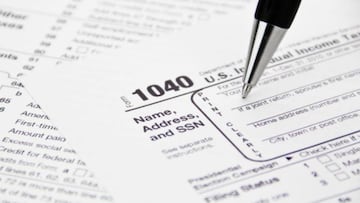How much money do you have to make to file taxes in the US?
Depending on your earnings, as a US taxpayer you may not have to submit a tax return. Here's a breakdown of the income requirements for filing taxes.

Depending on your earnings, as a US taxpayer you may not have to submit a tax return. However, it may be in your best interest to file even if you aren’t required to.
In March 2021, Democrats passed a sweeping covid-19 relief and stimulus bill, the American Rescue Plan, which enhanced several tax provisions. Those changes could benefit a large swath of the American public, especially those who struggle to make ends meet.
Taxpayers with kids could see healthy tax refund in 2022
How early can I file my taxes in 2022?
These IRS documents will help you negotiate your 2021 tax statement
Who receives the largest tax refund payments?
2022 tax filing season
Tax season kicks off 24 January, and the Internal Revenue Service recommends getting your 2021 tax return in early and to file electronically so that you can get you tax refund sooner. The agency has faced an uphill battle since the start of the pandemic pushing back the filing deadline two years in a row. But don’t expect to have extra time again this year.
Taxpayers in the United States have until 18 April 2022 to submit their federal income tax return for 2021 - but people whose earnings didn't reach a certain level do not have to file. Even if aren’t required to file, if you have children, you may be missing out on thousands of dollars in tax credits that could result in a healthy refund.
Income requirements for most people
For most taxpayers, a tax return must be filed if your income exceeded the following minimum income limits last year:
| Filing status | Age at end of 2020 | Minimum gross income |
| Single | Under 65 | $12,550 |
| Single | 65 or over | $14,250 |
| Married joint filer | Both spouses under 65 | $25,100 |
| Married joint filer | One spouse under 65 | $26,800 |
| Married joint filer | Both spouses over 65 | $28,500 |
| Married separate filer | Any | $5 |
| Head of household | Under 65 | $18,800 |
| Head of household | 65 or over | $20,500 |
| Qualifying widow(er) | Under 65 | $25,100 |
| Qualifying widow(er) | 65 or over | $26,800 |
Source: IRS
See the IRS Publication 501 for further details
Income requirements for dependents
If you are claimed as a dependent on someone else's tax return, a different set of income requirements apply to you. Dependents whose earnings are over the following minimums must file a 2021 return:
| Single | Married | |||||
| Age at end of 2020: | Under 65 | 65 or over | 65 or over and blind | Under 65 | 65 or over | 65 or over and blind |
| Unearned income above: | $1,100 | $2,800 | $4,500 | $1,100 | $2,450 | $3,800 |
| Earned income above: | $12,550 | $14,250 | $15,950 | $12,550 | $13,900 | $15,250 |
| Gross income above larger of: | $1,100 or earned income (max. $12,200) + $350 | $2,800 or earned income (max. $12,200) + $2,050 | $4,500 or earned income (max. $12,200) + $3,750 | $1,100 or earned income (max. $12,200) + $350 | $2,450 or earned income (max. $12,200) + $1,700 | $3,800 or earned income (max. $12,200) + $3,050 |
*Married dependents must file a tax return if their income was at least $5 and their spouse files a separate return and itemizes deductions.Source: IRS
Further IRS information on filing if you're a dependent (including definitions of earned, unearned and gross income)
Other situations in which you'll need to file a tax return
According to the IRS, you must also file a tax return if, for example:
- You are self-employed and had net earnings of at least $400 in 2020
- You owe any special taxes
- You earned $108.28 or more from a "church or a qualified church-controlled organization that is exempt from employer social security and Medicare taxes".
- For additional situations where you may be required to file a tax return check page 5 of Publication 501.
If you fit any of the above requirements, you must file a tax return even if you:
- Are a minor (see Dependents on page 3 of Publication 501)
- Lived or earned money in another country (see Publication 54)
- Lived in Puerto Rico (see Publication 570)
- Had income from Guam, the Commonwealth of the Northern Mariana Islands, American Samoa, or the U.S. Virgin Islands. (see Publication 570)
Related stories
Full IRS list of other situations in which you must file a return
If you have further questions you can use the IRS online tool “Do I Need to File a Tax Return?”


